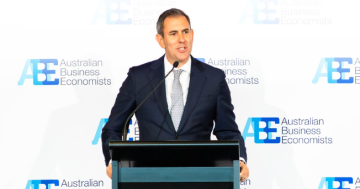
Productivity Commission outgoing chair Michael Brennan talks fresh approaches to growth. Photo: Productivity Commission.
Public policy needs to be devised with a fresh approach to risk-taking and less focus on gross domestic product, according to the Productivity Commission’s Michael Brennan.
In a recent address to the National Press Club, the commission’s outgoing chair said future productivity gains would be best achieved with a greater understanding of the value of quality.
He said that while working on the five-year productivity review, one of his consistent admonitions was that there should be less talk about abstract macro aggregates.
“Like GDP per hour worked, capital deepening and multi-factor productivity, and more about … concrete instances of what productivity growth really means and how it differs in specific cases. It’s partly because GDP is an imperfect measure of overall living standards,” Mr Brennan said.
“Also, because understanding the quality dimension might be increasingly important in a modern services-dominated economy – just as real cost reductions ruled the goods sector of the 20th century.
“It is important to realise that we need both. But talking about a smooth overall annual productivity growth rate obscures a bigger reality. Productivity growth is not smooth, rarely evenly distributed and almost never predictable.”
Mr Brennan said the Australian Public Service was full of smart and innovative people, who needed to be utilised creatively in the development of policy aimed at growth, but he added that defining such a task wasn’t an easy thing.
Connecting more with the private sector could be one area to better explore.
“The role for government isn’t always straightforward, but there is some role,” he said.
“For example, the public sector’s attitude to technology can play a key role in accelerating adoption by small firms. The most effective diffuser of knowledge is a dynamic, competitive economy.
“The evolutionary forces by which good ideas are rewarded, and by which resources flow to more productive firms, are what drives the economy forward towards higher levels of prosperity … and it’s not just the technology itself that matters.
“One lesson we can learn from the past is that the biggest productivity gains don’t just come from the simple adoption of a new technology but from complementary business innovation.
“That was the story of electricity – invented in the 1870s but not fully exploited by manufacturing businesses until well into the 20th century.
“The gains came not from replacing a steam-based source of power with an electric motor, but from the changes to the production line which were made possible by having multiple machines powered by electricity, rather than a single steam-based engine in the factory.”
He said while technology was vitally important, it was often an entirely new business model that drove the big gains.
That was where the approach to policy development came into play, and where thinking outside of the box could pay off.
“We need regulatory systems that look kindly on new business models; a tax system that promotes new-firm entry,” Mr Brennan said.
“We also need to think more about policies that could promote a healthy risk appetite among investors and would-be entrepreneurs.
“This brings us to the non-market sector – those services mainly funded and delivered by government, like health, education, community safety, child care, aged care and disability.
“Areas where we have settled on some very labour-intensive business models, and where innovation is not always encouraged, and diffusion of good ideas is not always easy.
“They are a big and growing share of the economy – too big to be exempt from potential productivity gains.”
In some cases, it would mean finding lower cost settings for service delivery.
He suggested more health care in the community rather than the hospital, aged care in the home, and alternatives to costly incarceration.
“Technology like AI, digital communications or robotics can also play a role, but their effectiveness will be blunted if rigid rules hamper their uptake,” he said.
“Again, it’s as much the business model as it is the technology itself.
“Health is a sector with remarkable technological uptake when it comes to medical innovation – new drugs, diagnostic equipment or surgical procedures.
“But a laggard when it comes to the use of general technology to improve the quality of service to patients or reduce costs …
“Other areas of service delivery explicitly enshrine staff ratios …
“And then there is the question as to whether the very structures of government can adapt when needed to deliver better outcomes.”




















